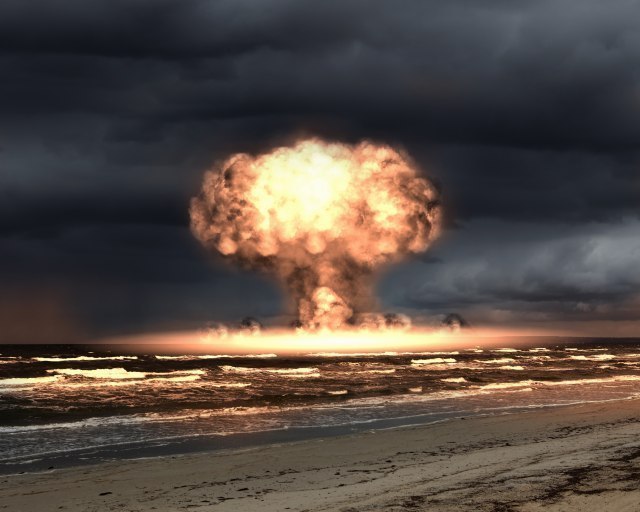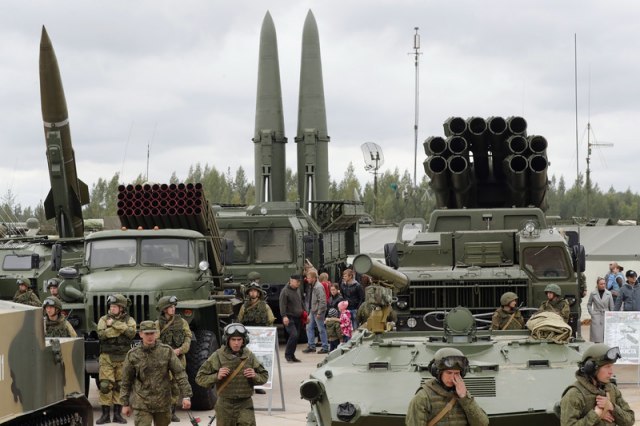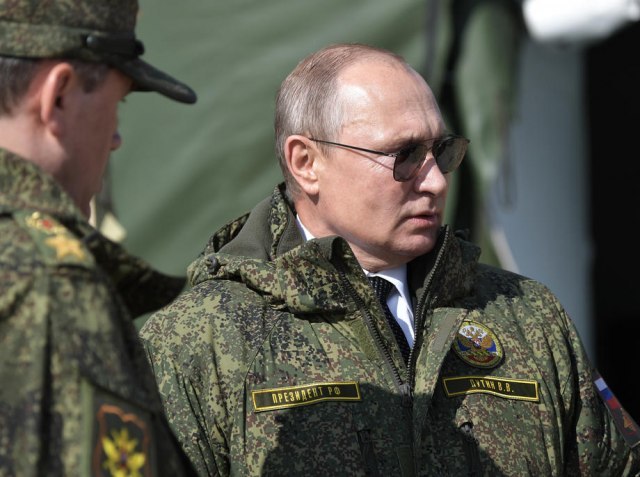First scenario: Russians drop a nuclear bomb, Americans respond. Others: The end
The greatest fear is that Putin could order the use of tactical nuclear weapons of limited destructive power.
Friday, 23.09.2022.
09:30

First scenario: Russians drop a nuclear bomb, Americans respond. Others: The end
In the event that he finds himself pressed against the wall by the defeats of his forces in Ukraine, especially after the rigged referendums turn the occupied territories into the self-proclaimed territory of the Russian Federation, that may happen, writes Jutarnji list.The text states that in such a scenario, the Russian military could launch an attack with a nuclear bomb or a cruise missile with a nuclear warhead, such as the nuclear version of the short-range Iskander-M tactical missile.
On paper, Russia has about 2.000 tactical nuclear warheads, ranging from a few kilotons to more than a hundred. The question remains as to how much of the Russian arsenal is really usable, considering that it is a question of extremely sophisticated weapon systems that require very detailed and expensive maintenance, and Russia spends ten times less on maintaining its arsenal per warhead than any other country in the world, including China.
But if Russia has functional warheads that it could launch with Iskander-M missiles, estimated at around 50 kilotons, it could do terrible damage to Ukraine if it chose to do so.
Radioactive cloud

Most unprotected people within a radius of about three kilometers would suffer third-degree burns. It is estimated that the explosion itself would have killed around 48.000 people, while more than 100.000 of them would have been seriously injured.
The radioactive cloud would spread in the direction of the wind, and with a north wind of about 20 kilometers per hour, it would spread over an area twenty kilometers wide and up to 160 kilometers long - enough to cross the border with Belarus. With a stronger wind, of about 60 kilometers per hour, radioactive particles could also cross the Russian border.
Although it would be a devastating disaster for those directly affected by it, most people outside the blast zone itself would not feel any significant effects. A light shock wave would only reach about 4.3 kilometers away from the point of detonation, and even the particles in the radioactive cloud would pose a lethal threat to most.
In the direct path of the cloud, the first sixty kilometers long and about five kilometers wide, the radiation dose would be about one heat per hour, which means that most of those affected could move out of the way of the cloud before receiving a significant dose of radiation.
Weapons of mass destruction

There is no button that Putin can push, alone in his office, to have the Iskander-M take off and hit a target of his choosing. The launch of a tactical nuclear weapon would have to involve hundreds of people - from Putin himself, then several levels of military command, the personnel who would have to remove the warhead from storage and deliver it to the site, then the personnel who would have to mount the weapon on the missile, then the personnel which would have to aim and fire that missile.
In that long chain, it is easily possible to find an individual or even several who are unwilling to participate in an attempt at nuclear warfare. Even if Putin decided to use such "limited" weapons of mass destruction, and if his military decided to obey him, the question is what could be achieved, what tactical or political advantage would it bring him, and what would be the West's response to his move?
Militarily speaking, most of the Ukrainian forces are dispersed over a wide area, except on the very front line where any nuclear strike would be equally damaging to the Russian forces. Politically, such a blow could possibly destroy the Ukrainian government and kill President Volodymyr Zelensky, but at what cost?
First, it would set a precedent - a very uncomfortable one for Putin - for Russia to consider the head of state a legitimate target for a limited nuclear strike. Second, Putin would irreversibly destroy his relationship with his most important "allies" China and India, which are currently staying on the sidelines in the conflict and have not unequivocally condemned the Russian invasion of Ukraine.
Furthermore, the question arises as to how the USA and NATO would respond to this kind of provocation. Western strategists agree on one thing - the use of nuclear weapons must be responded to immediately, fiercely and unambiguously. Any other answer would be an open invitation to all other nuclear weapon states to use them at will.
Destruction of the world
The problem is that any response necessarily brings with it the risk of further escalation. Princeton experts analyzed three years ago a potential scenario that begins with nuclear "warning shots" but inevitably ends in full-scale nuclear war.In a series of war games conducted by the Pentagon, American experts determined that any use of nuclear weapons very easily leads to uncontrolled escalation. In most tested scenarios, Russia launches an attack using a tactical nuclear bomb against a military installation - an air port or a military base - to which the US responds by striking a target of similar type and military importance. After that there are only two possibilities.
In the optimistic scenario, both sides refrain from further use of nuclear weapons, but all these positive scenarios had several common preconditions - both sides had to have clear political "off-ramps" and the lines of communication between Moscow and Washington had to remain open. In all other scenarios, the world will face demise.
























































Komentari 8
Pogledaj komentare